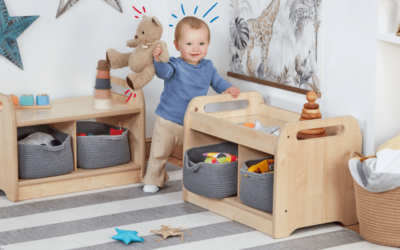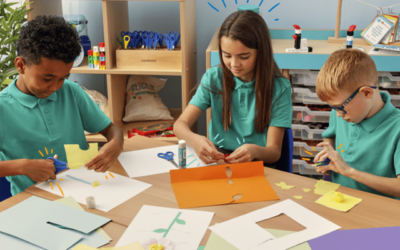Bridging the gap: literacy in early years
Effective early years literacy activities can make a major difference when it comes to bridging the gap between children who are ready for school and those who aren’t. We know that the development of young children can depend on many different factors. Good communication, reading, writing and motor skills all add to a well-developed child who is then prepared for primary school learning. Children often learn these skills at a different pace to one another in the early years, but this is completely normal.
We’ve pulled together 5 simple tips to help bridge the gap between those early learners who may be struggling with literacy skills and the children who feel more prepared for primary school.
Give a little extra talking time
The benefits of talking to children begins from birth. The sounds and words we use are constantly being absorbed by children. When language arrives and children start to form their own words and sentences, this absorption increases even more. When you see a child, who may be struggling with their communication, try to lend an extra minute or so to ask them about their day, talk, tell stories or jokes. These extra minutes spent with children who struggle could be the difference to bring them up to the level of the wider group.
One of the most important literacy skills, reading. In groups, always pause to ask questions about the sentences or page you have just read to them. This encourages a better understanding of vocabulary. Make sure you stock a mix of fiction and non-fiction books; variety is always useful for readers and listeners to understand more topics. If individuals are struggling, try a little extra one-on-one reading time and encourage parents to do the same.
Make it rhyme time
Rhyming is fun for young children; it helps them to understand the sounds of words and the pace of sentences. Phonics can help children to develop their listening and speaking. Try simple rhyming games like saying “cat” or “bug” and have your class shout back answers which rhyme e.g. “bat” or “tug”. When they run out of words that rhyme, have them make some up and tell you what they think that word means! Again, for learners who struggle, try a smaller group of those of a similar ability to encourage participation.
Set up an art and scribble corner
Mark-making, motor skills and colouring with writing tools are all key to developing literacy skills that will take learners through to primary school. Writing names, letters and made up words can all have a benefit to improving language and reinforcing vocabulary. Create a corner in your nursery just for this, a table or two with blank paper, coloured paper, stamps, crayons, markers, pencils, glue sticks, scissors and paint. For those who struggle, spend extra time encouraging and helping.
Give extra support to motor skills
Outdoor play is not just helpful for keeping children healthy. It is also useful for developing fine and gross motor skills that are important for literacy. Skipping, running, climbing, and jumping improve gross motor strength. Lacing, stacking, tying activities when indoors provide good practice of fine motor abilities that will aid writing skills. For those who struggle, encourage extra practice at home with parents.
Improving literacy to bridge the gap between early years and primary school is important. Give that extra bit of time to a child that you see struggling with reading, writing or communicating. They will appreciate it and will benefit hugely when they come to joining primary school.
Related blogs
Your Guide to the School-Based Nursery Capital Grant
What is the School-Based Nursery Capital Grant? For schools aiming to enhance their nursery facilities, the School-Based Nursery Capital Grant provides a simple funding solution. This grant is open to eligible state-funded primary schools in England that...
What Goes In, Must Go Out
Creating a Circular Economy in Your Nursery Author: Nick Corlett Sustainability Manager at LEYF Sustainability is more than a trend—it’s a shared responsibility, and the nursery is the perfect place to nurture these skills. Every day...
Top tips to create a SEND-Friendly Primary School Classroom
Author Lindsay Robinson Lindsay Robinson has been a primary school teacher for 23 years and is passionate about achieving the very best outcomes for children through quality first teaching and experiences. I remember receiving very little guidance during my teacher...


